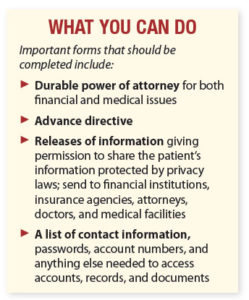Stages of Alzheimer’s Disease: What to Expect and How to Prepare
For many chronic diseases, evaluating the stage of the disease is part of the diagnostic process, and it is a main factor in treatment decisions. But Alzheimer’s disease (AD) affects each patient differently, so it can be difficult to pin down the various stages.
“There is no standard set of stages,” explains Lisa Ravdin, PhD, a memory disorders specialist and director of the Weill Cornell Neuropsychology Service in the department of neurology. “One reason it’s hard to define clear, distinct stages is that this disease occurs on a continuum. There’s rarely any discrete day that a patient with AD goes on to the next ‘stage’ of the disease.”
Phases of Alzheimer’s Disease
Some common terms for various points on the AD continuum are early, middle, and late, or mild, moderate, and severe.
“Many patients who develop AD may first have a condition called ‘mild cognitive impairment’ (MCI),” explains Dr. Ravdin. “At this point, patients may notice that it’s more difficult to remember people’s names or where they put things, but they are fully able to function in everyday life.
“Next comes early-stage or mild dementia, during which memory problems and other symptoms become more noticeable, especially to family members and close friends.”
The patient may have word-finding problems, lose important objects, have difficulty completing tasks at home or work, and/or have trouble with planning and organization. However, they are usually still able to work, socialize, and take care of domestic tasks such as shopping, cooking, and housecleaning.
As the disease progresses, patients have difficulty expressing thoughts and performing routine tasks, and they may become frustrated or angry. Confusion is common; they may be unable to identify where they are or to recall the day or year. They may need help remembering to bathe and attend to their hygiene and grooming. Some patients may lose partial or total control of their bladder or bowels. Suspiciousness and delusional thinking also may occur.
Eventually, a patient with late-stage AD will need help with toileting, bathing, dressing, and other activities of daily living. They may be unaware of their surroundings and may need to be monitored constantly to ensure their safety.
Preparing for the Future
When a person is diagnosed with AD, making plans for the future is often a top priority. However, Dr. Ravdin notes that the need for planning isn’t limited to those with AD: “Everyone should get their affairs in order, regardless of whether or not they have dementia. For all of us, life circumstances can change quickly; although it’s unlikely, a catastrophic event such as a debilitating accident can occur at any time.”
It’s important for a person with AD to choose someone (usually referred to as their “representative” or  “agent”) to be their power of attorney, which gives that person the authority to act on the patient’s behalf if he or she becomes unable to make or communicate decisions. An estate planning and/or elder law attorney can explain what is needed.
“agent”) to be their power of attorney, which gives that person the authority to act on the patient’s behalf if he or she becomes unable to make or communicate decisions. An estate planning and/or elder law attorney can explain what is needed.
When Care Is Needed
For patients whose loved ones cannot provide the level of care that’s needed, in-home care is often the first step in getting “outside” help. Check with the patient’s insurance company to find out what type of in-home care is covered.
It’s not uncommon for patients to resist receiving in-home care or other assistance, such as help paying bills and getting to appointments.
“Impaired insight is part of the disease process,” explains Dr. Ravdin. “People with AD are unaware of how often they forget, so they may believe they’re fine and they don’t need any help.”
Dr. Ravdin suggests keeping the patient’s primary care physician informed about the patient’s condition.
“Even if the patient has not given permission for you to get information from his or her doctor, you can still give information to the doctor, so he or she will be aware of any problems the patient is having,” says Dr. Ravdin.
If you have concerns, ask the doctor to address them with the patient at his or her next appointment. A doctor probably has a better chance than a family member of convincing the patient to accept assistance—and it will help you avoid conflict with your loved one.
The post Stages of Alzheimer’s Disease: What to Expect and How to Prepare appeared first on University Health News.
Read Original Article: Stages of Alzheimer’s Disease: What to Expect and How to Prepare »

